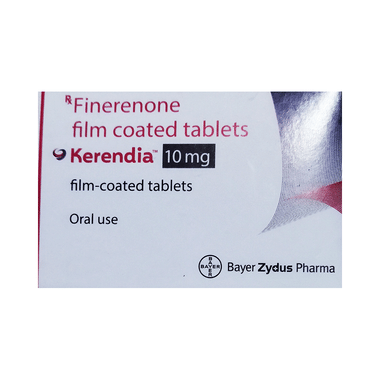All Details About Kerendia 10 Tablet
Find out detailed description, uses, directions of use, side effects, warnings and precautions, frequently asked questions about Kerendia 10 Tablet
Description:
Kerendia 10 Tablet is a medicine used for reducing the risk of heart attack and heart failure in adult patients with chronic kidney disease (CKD) associated with type 2 diabetes. It makes the heart pump blood more efficiently.Kerendia 10 Tablet may be taken with or without food. Your doctor will decide the dose and duration of the medicine for you. The doctor may closely monitor your blood pressure, heart rate, and ECG till you become stable. You should continue all your other medicines that are advised by the doctor for your long-term treatment even after this injection.
Ordinary side effects of this medicine include hyperkalemia, hypotension and hyponatromia. Consult your doctor if these effects bother you. This medicine is used with caution for some people. Thus, you must inform the doctor if you are suffering from any kidney or liver disease. Also, let your doctor know if you are pregnant or breastfeeding and about all the other medications that you are taking regularly.
Directions For Use:
Ordinary side effects of Kerendia
- Increased potassium level in blood
- Hypotension (low blood pressure)
- Decreased sodium level in blood
Side Effects:
Most side effects do not require any medical attention and disappear as your body adjusts to the medicine. Consult your doctor if they persist or if you’re worried about themWarning & Precautions:
Alcohol
CONSULT YOUR DOCTOR
It is not known whether it is safe to consume alcohol with Kerendia 10 Tablet. Please consult your doctor.
Pregnancy
CONSULT YOUR DOCTOR
Kerendia 10 Tablet may be unsafe to use during pregnancy. Although there are limited studies in humans, animal studies have shown harmful effects on the developing baby. Your doctor will weigh the benefits and any potential risks before prescribing it to you. Please consult your doctor.
Breast feeding
CAUTION
Kerendia 10 Tablet should be used with caution during breastfeeding. Breastfeeding should be held until the treatment of the mother is completed and the drug is eliminated from her body.
Driving
CONSULT YOUR DOCTOR
It is not known whether Kerendia 10 Tablet alters the ability to drive. Do not drive if you experience any symptoms that affect your ability to concentrate and react.
Kidney
SAFE IF PRESCRIBED
Kerendia 10 Tablet is safe to use in patients with kidney disease. No dose adjustment of Kerendia 10 Tablet is recommended.
Liver
SAFE IF PRESCRIBED
Kerendia 10 Tablet is safe to use in patients with liver disease. No dose adjustment of Kerendia 10 Tablet is recommended.
FAQs:
Q. Does Kerendia 10 Tablet reduce the risk for heart failure events in high-risk patients?
Affirmative, a study reported that Kerendia 10 Tablet reduces new-onset of heart failure and improves other heart failure outcomes in patients with chronic kidney disease and type 2 diabetes, irrespective of a history of heart failure or heart disease.
Q. Does Kerendia 10 Tablet increase potassium levels in the body?
Affirmative, Kerendia 10 Tablet may result in hyperkalemia (increased potassium level), especially in patients with reduced kidney function and with already high potassium levels. Your doctor may monitor your potassium level before and during the treatment with Kerendia 10 Tablet and may adjust its dose accordingly.
Q. What is the dosing frequency of Kerendia 10 Tablet?
Dosing of Kerendia 10 Tablet is based on estimated glomerular filtration rate (eGFR). eGFR is the amount of waste, in milliliters, your kidneys should be able to filter in a minute. The initial dose of Kerendia 10 Tablet is 20 mg daily for eGFR of ≥ 60 mL/min and 10 mg daily for eGFR of ≥ 25 to < 60 mL/minute. This medicine is not recommended for patients with eGFR < 25 mL/min. Your doctor may also adjust the dose if you have a high potassium level.
Q. Can a breastfeeding women take Kerendia 10 Tablet?
Breastfeeding is not recommended during treatment with this medicine and for 1 day after the treatment.
Q. Can Kerendia 10 Tablet result in low blood pressure?
Affirmative, Kerendia 10 Tablet may cause a decrease in blood pressure that can lead to hypotension.
Disclaimer:
Getomeds primary intention is to ensure that its consumers get information that is reviewed by experts, accurate, and trustworthy. The information and contents of this website are for informational purposes only. They are not intended to be a substitute for professional medical advice, diagnosis, or treatment. Please seek the advice of your doctor and discuss all of your concerns about any disease or medication. Do not disregard or postpone seeking professional medical advice because of something you read on Getomeds. Our mission is to support, not replace, the doctor-patient relationship.

